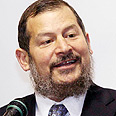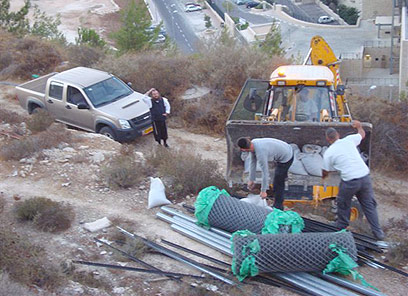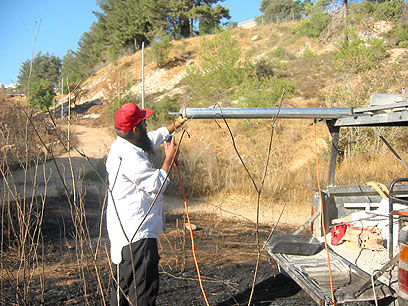
In the last three weeks, the situation has reached new levels, and every Shabbat a group of anonymous people arrive at the eruv posts and vandalize it by cutting its wires.
The “Eruv HaMehudar Committee” (adorned eruv) filed a complaint on the issue at the Jerusalem police department.
As part of an investigation which began, numerous suspects were summoned for interrogation but it seems that the issue is far from being solved.
In light of the events, an emergency meeting took place on Sunday with the participation of Jerusalem’s neighborhood rabbis at the offices of the eruv committee.
At the meeting, the rabbis decided to call upon all the city’s inhabitants to refrain from relying on the large eruv surrounding the whole city which was installed by the religious council and from now on they should rely only on their neighborhood eruvs, if they exist.

Placement of adorned eruv
In addition, it was decided that if the police do not apprehend the accused, an emphatic and wide-ranged struggle will be declared.
The chairman of the eruv committee Rabbi David Eisenstein told Ynet that the significance of causing damage to the eruv’s wires is severe. “If a mother has small children, she can’t go out with her carriage.
“This is acute, she is in jail for the entire Shabbat. A person cannot go to the synagogue with a prayer book in hand or conduct a brit (circumcision) for their son at a hall during Shabbat because it is forbidden to carry anything,” said the rabbi.
“This is a painful subject for the wide public of inhabitants. Whoever is doing this is stricken with blind hatred and this is unjustified,” he said.
200 installed posts destroyed
The past two years have seen various disputes between the sides regarding installment of the eruv and three months ago the war was sparked anew.These altercations came after the eruv committee installed more than 200 posts withing a 32 kilometer (20 mile) range on the road leading to the city’s Hadassah Ein Kerem Hospital.
In one of these instances, the Kiryat Hayovel neighborhood’s local administration decided to saw off a number of posts placed on the neighborhood streets.
When ultra-Orthodox inhabitants noticed what occurred, a riot ensued and in light of the confrontation which broke out between the sides, the police were called to the scene in an attempt to restore the calm.
As of late, the eruv issue has taken a worrisome turn for the worse. Every Shabbat for the past three weeks, a group of unknowns arrive at the site and cut the eruv’s wires.
This sabotage is caused to the eruv erected by the religious council, the haredi sector and the eruv committee alike.
In certain instances, the unknowns even ignited some of the posts. This eruv vandalization has occurred in numerous Jerusalem neighborhoods including Kiryat Menachem, Armon Hanatziv, Bayit VeGan, Givat Mordechai and Givat Shaul.

The cut posts (Photo: Shlomo)
Haredi ambush on Shabbat
The police, who are investigating the incidents, have asked the ultra-Orthodox people involved to avoid incitement and in return, promised that measures would be taken in finding the accused.Last Saturday, eruv committee members decided to obey the Sabbath in the field in order to personally discover who is vandalizing the wires.
So, at around 1 am between Friday and Saturday, three vehicles arrived at the site and a number of men stepped out of their vehicles equipped with long tools and started cutting the eruv; wire after wire.
Members of the haredi organization stood opposite them and tried screaming “Shabbas” but did not dare confront the unknowns who yelled, “haredi maniacs,” in response.
According to Rabbi Eisenstein who was present at the scene, it seemed as though these unknowns were hired in exchange for payment by someone and, “as opposed to the police’s promises, no police patrol took place in the area whatsoever,” he added.
'We don’t want influx of haredim'
The source of the battles is the Kiryat Hayovel neighborhood which is situated above the Hadassah Ein Kerem Hospital.According to one of the area’s residents, the whole story began two years ago when haredim began placing eruv posts inside the neighborhoods in addition to those already placed by the religious council.
This phenomenon, in his opinion, is very characteristic in haredi neighborhoods but bothersome to Kiryat Hayovel’s secular inhabitants.
“They began placing an eruv which cut the Kiryat Hayovel neighborhood,” said Danny who prefers remaining anonymous in light of threats he has already received.
“In many cases they used an existing fence or house entrances and started welding posts on them. Posts were definitely placed and ruined the view or were sidewalks; causing a real safety hazard.
“We did not know who was installing these posts. They would come at odd hours and when the police were called, they would leave,” said Danny.
According to Danny, the basis for their opposition to placement of eruv posts is first and foremost the illegality of it all especially since the posts are not placed in accordance with neighborhood authorities or backed by necessary legal permits.
“I can’t insert a post anywhere I want. You have to undergo an organized process and not every private body can do whatever they feel like doing,” he said.
In addition the ultra-Orthodox character the neighborhood is getting with the placement of eruv posts is undesired by many inhabitants.
In Danny’s estimation, “an eruv is definitely a haredi symbol and we don’t want an influx of haredim in southwest Jerusalem.
“It is not healthy for them or for us. The eruv equips the neighborhoods for haredim to a certain degree and this immixture with the ultra-Orthodox public only causes unnecessary friction.”
‘Shas representative permitted us to place posts’
In light of the events, Danny and some additional residents turned to the Jerusalem Municipality and firstly to Jerusalem Mayor Uri Lupolianski demanding him to act on the issue.
In his letter, Danny expressed his fear that the situation may end in bloodshed. His appeal has not yet been answered and the same can be said for additional complaints on the issue.
Moreover, one of the times he came up against one of the post placers and asked him to show the necessary permits and the man flashed a certification signed by Shmuel Yitzhaki, a member of the Jerusalem municipal council for Shas.
The only appeal that did receive a response from the Jerusalem Municipality was from Shlomit Rubin, the city comptroller.
In a letter she sent to Lupolianski on the issue, Rubin noted that she turned to Yitzhaki in order to receive answers but he denied any connection to the issue.
Rubin has been seeking answers since she got hold of a document signed by Yitzhaki allowing the posts.
The comptroller noted in her letter that she has arrived at the conclusion that there, “is not much” in Yitzhaki’s answer and thus demanded the city’s mayor to warn the Shas councilman that he mustn’t take measures in actions which exceed his authority.
Rubin also wrote in her letter that “as far as I know the competent authority permitted to place an eruv in the city is the religious council and the eruv was indeed built and maintained by the council for years.
“The public areas in the city’s jurisdiction are not deserted and people shouldn’t feel at home there. The general feeling in the public is that there is no authority generating the law and that people are doing what ever they see fit,” said Rubin.
In light of the complaint filed at the police by the eruv committee, Danny was summoned for interrogation.
According to him this is completely absurd, “it is simply amazing that I am being questioned by the police for alleged crimes while there are people who are openly breaking the law.
“There are illegalities here and an attempt to place haredi symbols in the secular community and we are not interested in them. There is also a safety hazard in placing posts on the side of the road for instance and this is a first-class aesthetic shortcoming,” said the Kiryat Hayovel resident.
According to him, the activity against the installment of eruv posts can be concluded by sending letters to the Jerusalem Municipality and to the State comptroller despite the fact that he is not surprised that vandalization of the posts and cutting of the wires has occurred.
“It doesn’t surprise me that at the end of the day people are taking measures because the secular public is sick and tired of the fact that the municipality doesn’t enforce its laws,” he said.
In opposition to these claims, Rabbi Eisenstein explained that “the religious council’s eruv surrounds the neighborhoods from the outskirts and the eruv being placed by the committee is more internal and more adorned.”
According to him, the organization is backed by all the necessary permits from the Jerusalem Municipality and there “is no authority in the municipality, from the mayor and until the last clerk, that did not provide the necessary permits.”
When asked about the fact that placement of the eruv in under the religious council’s authority, the rabbi said in his own defense that “the religious council was dismantled a few years ago.
Yitzhaki: I never gave the permits
“They don’t have a budget and no one maintains the eruv. An eruv is a legal necessity and the religious council is supposed to maintain it,” he said.“Since this is not happening, the municipality placed its construction in our hands. We provide religious services within a legal framework and complete the work of the religious council. We take the mandate for placing the posts from the validity of the law and from the validity of Jewish law,” said the rabbi.
City councilman Shmuel Yitzhaki said in response, “I never gave the permits allowing the installment of the eruv and I told the comptroller the same.
“The discussed documentation notes the agreement I, as a representative of the Jerusalem Municipality had with the religious council in which it was decided that the same people who covered the costs will also conduct the work. This is not a permit but a regulatory agreement,” he said.
When asked why placement of the eruv was placed in private hands he said, “There were many changes in the religious council and the issue of the eruv was not maintained. Since there are people asking to assist in the issue, why not?”
The city stated that “the Jerusalem Municipality is working to bridge between the various populations. A Shabbat eruv exists in every city in Israel regardless of the population’s composition and is placed in the hands of the religious council.”















